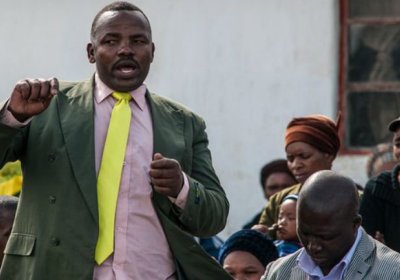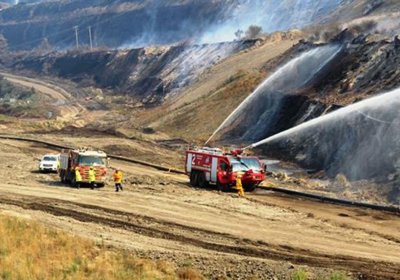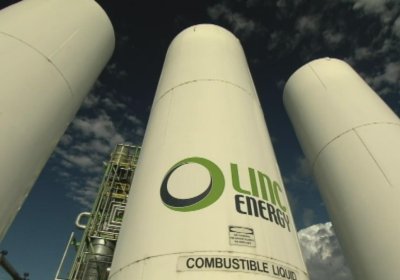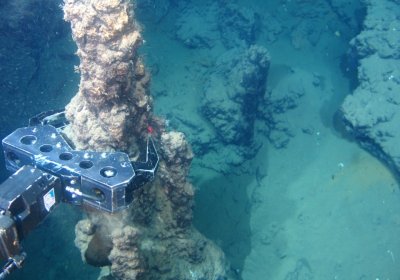Sikhosiphi “Bazooka” Rhadebe, chairperson of the Amadiba Crisis Committee and a leading campaigner against the Australian-owned Xolobeni mineral sands mine in South Africa was shot dead in his home on March 22.
Mining
Opponents of Shenhua-Watermark's mega coalmine in the Liverpool Plains in north-western NSW have been given a boost by the Chinese government-owned company's annual report released on March 24, which hinted it may not proceed.
The Illawarra Knitting Nannas Against Gas (I KNAG), held a "knit-in", in Edgecliff in Sydney, at the office of Prime Minister Malcolm Turnbull on March 21.
He was not there and had not answered the two simple questions the Nannas had left him earlier. “Do you support a ban on coal seam gas (CSG) mining in drinking water catchments?" and “Would you move federal legislation to enact a ban on CSG mining in drinking water catchments?”
 "This is a law to protect the rich. We will need to break these laws to protect our democratic rights," Aboriginal activist and lead NSW Senate candidate for the Socialist Alliance team in the federal elections Ken Canning, said on March 15.
"This is a law to protect the rich. We will need to break these laws to protect our democratic rights," Aboriginal activist and lead NSW Senate candidate for the Socialist Alliance team in the federal elections Ken Canning, said on March 15.
Slick Water: Fracking – and One Insider’s Stand Against the World’s Most Powerful Industry
Andrew Nikiforuk
Greystone Books/David Suzuki Institute
2015, 350 pages
The fracturing of rocks to mine more fossil fuels was born with the oil business, writes the Canadian journalist, Andrew Nikiforuk, in Slick Water.
During the world’s first oil boom in Pennsylvania in the 1850s, highly volatile nitro-glycerine and other explosives were used on sluggish wells with lethal risk, to turn them into gushers by creating new fractures to channel blocked oil to the surface.
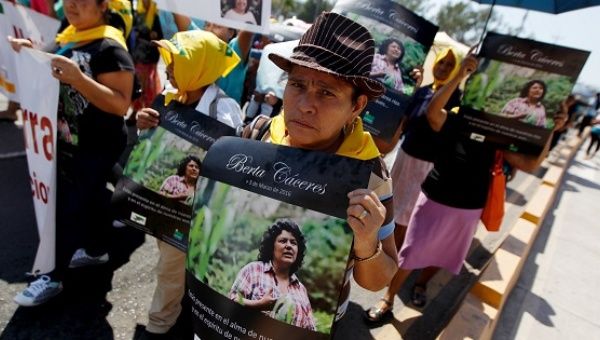 Tegucigalpa, Honduras, March 16.
A group of 730 leading Latin American experts and scholars have called for United States Secretary of State John Kerry to halt aid and support to Honduras until the Central American country improves its atrocious human rights record.
Tegucigalpa, Honduras, March 16.
A group of 730 leading Latin American experts and scholars have called for United States Secretary of State John Kerry to halt aid and support to Honduras until the Central American country improves its atrocious human rights record.
The Victorian Environment Protection Authority is expected to file 12 air pollution charges against the Hazelwood power station operator, GDF Suez, over the Morwell coalmine fire.
The fire burned for 45 days in 2014, covering Morwell in smoke and ash. Residents were advised to leave by health authorities.
An inquiry found GDF Suez had failed to adequately prepare for the fire, which was sparked by a nearby bushfire, and that the fire probably contributed to increased deaths in the region.
Linc Energy will stand trial on five charges that it breached Queensland's environmental laws at its underground coal gasification site.
The Department of Environment and Heritage Protection (DEHP) has accused the company of wilfully causing serious harm at its trial site near Chinchilla on the Darling Downs.
A cost-benefit analysis released by the Secretariat of Pacific Communities (SPC) and the European Union on potential deep sea mining (DSM) projects in three Pacific countries found that the projects can be viable. But other research suggests there remain serious concerns about the new, untested DSM industry.
The NSW Minerals Council chief executive Stephen Galilee is keen on new anti-protest laws in NSW. He claims to be concerned about the safety of the workers as well as the protesters “illegally accessing mine sites”.
Mining and Energy Minister Antony Roberts has been a little more blunt: he says the new law is aimed at better enforcing the protection of private property and “lawful business activity”.
Most, however, can see through the spin.
 On International Women’s Day, three women locked themselves to habitat trees in the critically endangered Leard State Forest in north west NSW. Gomeroi women gathered on Leard Forest Road to show support and solidarity for the action.
On International Women’s Day, three women locked themselves to habitat trees in the critically endangered Leard State Forest in north west NSW. Gomeroi women gathered on Leard Forest Road to show support and solidarity for the action.
The powers-that-be in NSW have deemed that there are so many examples of “unsafe protest activities” across the state that, to make everyone safe, we need new laws that will protect “lawful business activity”.
Protesters will be able to be jailed for up to seven years for “intentionally” or “recklessly” interfering with a “mine” — the definition of which has been changed to include an exploratory or test site.
- Previous page
- Page 17
- Next page
